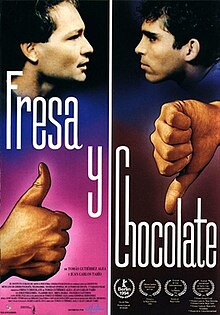

| Strawberry and Chocolate | |
|---|---|
 | |
| Spanish | Fresa y chocolate |
| Directed by | Tomás Gutiérrez Alea Juan Carlos Tabío |
| Written by | Story and screenplay: Senel Paz |
| Produced by | Camilo Vives Frank Cabrera Georgina Balzaretti |
| Starring | Jorge Perugorría Vladimir Cruz Mirta Ibarra Francisco Gattorno |
| Music by | José María Vitier |
| Distributed by | Miramax Films (USA) |
Release date |
|
Running time | 108 minutes |
| Countries | Cuba Mexico |
| Language | Spanish |
Strawberry and Chocolate (Spanish: Fresa y chocolate) is a 1993 internationally co-produced film, directed by Cuban filmmakers Tomás Gutiérrez Alea and Juan Carlos Tabío, based on the short story "The Wolf, The Forest and the New Man" (in Spanish, El Lobo, el bosque y el hombre nuevo). Senel Paz had witten the short story in 1990, and also wrote the screenplay for the film. It was the first Cuban film to be nominated for an Academy Award.[1]
The story takes place in Havana, Cuba, in 1979. David (Vladimir Cruz) is rejected by Vivian, who marries an older and wealthier man. It is revealed that he is a university student when he meets Diego (Jorge Perugorría), a gay artist unhappy with the Castro regime's attitude toward the LGBT community as well as the censored conceptualization of culture. David's homophobic classmate, Miguel (Francisco Gattorno), plans to use David to spy on Diego, a person whom they see as aberrant and dangerous to the Communist cause. Diego, for his part, initiates the friendship with sexual intentions, but David mostly rejects his advances.
Although David initially chafes at the idea of being Diego's "baby," he decides to do so to relay information back to Miguel. The two form a tenuous friendship in the process of this spying, and David makes it clear that their relationship will be platonic. Nancy, a "vigilance" who lives above Diego, attempts suicide as David arrives one day, and he ends up donating blood so that she can recover. As David spends more and more time with Diego, he argues with him about Communism, sexuality, and what is truly revolutionary. After constantly reporting their activities to Miguel, David eventually erupts, telling Miguel that Diego has principles despite his sexuality. Vivian tries to reconnect with David and begin an affair, but he finally rejects her advances. David begins to show more signs of affection for Diego, buying him flowers and posting Marxist icons in Diego's room, and letting him read his manuscript.
In a side plot, Diego and German, his artist protégé and sexual partner, are unable to exhibit their full collection of work. In this process, the two have a falling out, and Diego sends an angry letter to the museum curators of Cuba. This leads to his firing and an inability to find work outside of manual labor due to his blacklisting by the government. Diego tells this to Nancy, who has developed a romantic interest in David. In a gesture of friendship to both parties, he decides to set Nancy and David up, and David loses his virginity to Nancy. In the days after, Miguel comes to Diego's apartment, accusing David of being homosexual.
Diego eventually decides to leave the country, but is unable to keep it a secret from David. He confesses his love for David and reveals that it was not denying rumors of being in a relationship with David that led to David's false "outing" as a gay man. Despite this, David embraces Diego with a hug, leaving their future relationship ambiguous.
Chicago Sun-Times film critic Roger Ebert comments that "nothing unfolds as we expect. Strawberry and Chocolate is not a movie about the seduction of a body, but about the seduction of a mind. It is more interested in politics than sex — unless you count Sexual Politics, since to be homosexual in Cuba is to make an anti-authoritarian statement whether you intend it or not."[2]
The title refers to a comment made by Diego that immediately proves to David that Diego is gay when at Havana's Coppelia (ice cream parlor) he chooses strawberry ice cream even though chocolate (vastly more popular) is available.
|
Films directed by Tomás Gutiérrez Alea
| |
|---|---|
|
|
Films directed by Juan Carlos Tabío
| |
|---|---|
|
|
Gramado Film Festival Best Picture Award
| |
|---|---|
| 1973 — 1989 |
|
| 1990 — 2009 |
|
| 2010 — present |
|
|
| |
|---|---|
| 1965–2000 |
|
| 2001–present |
|
|
| |
|---|---|
|